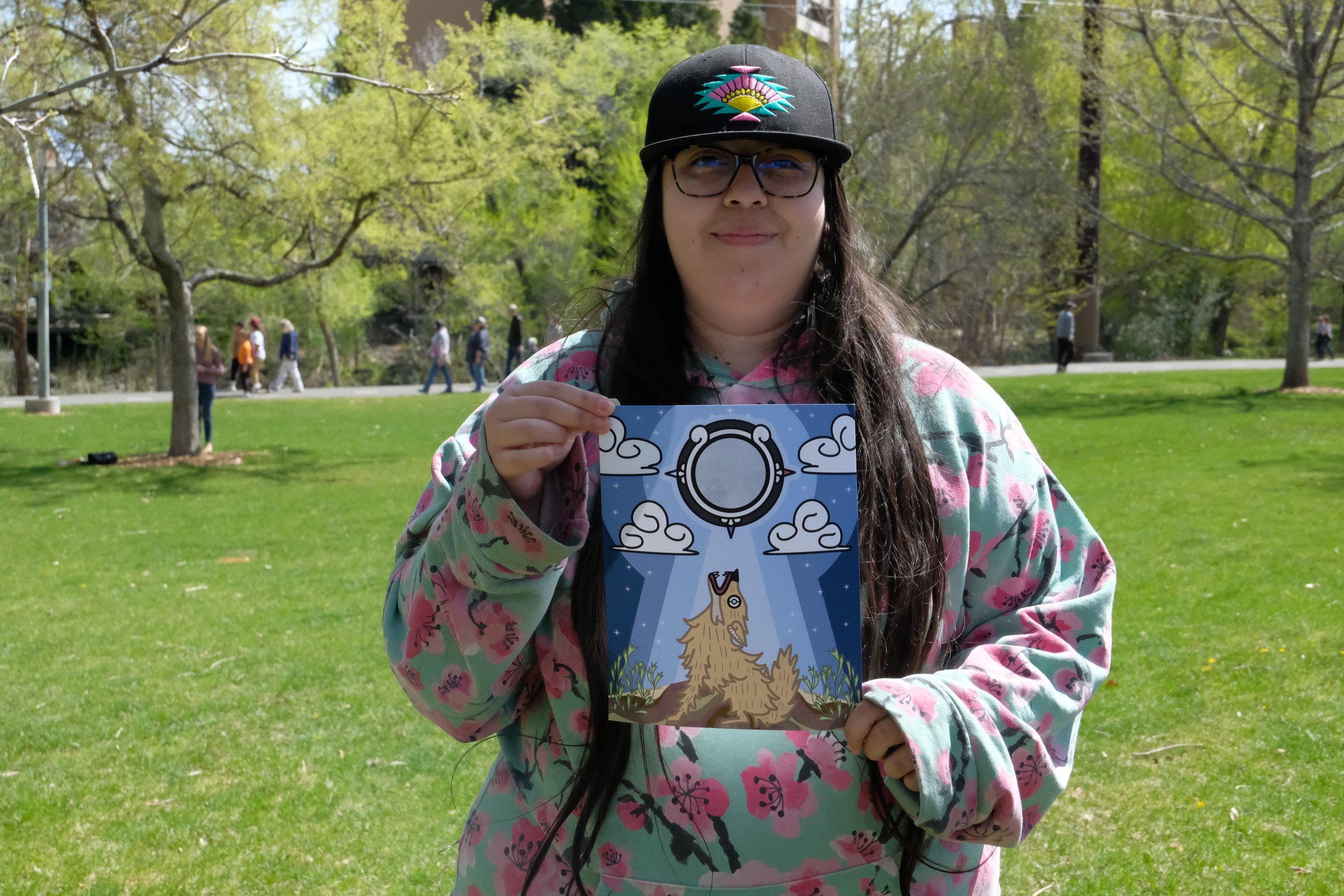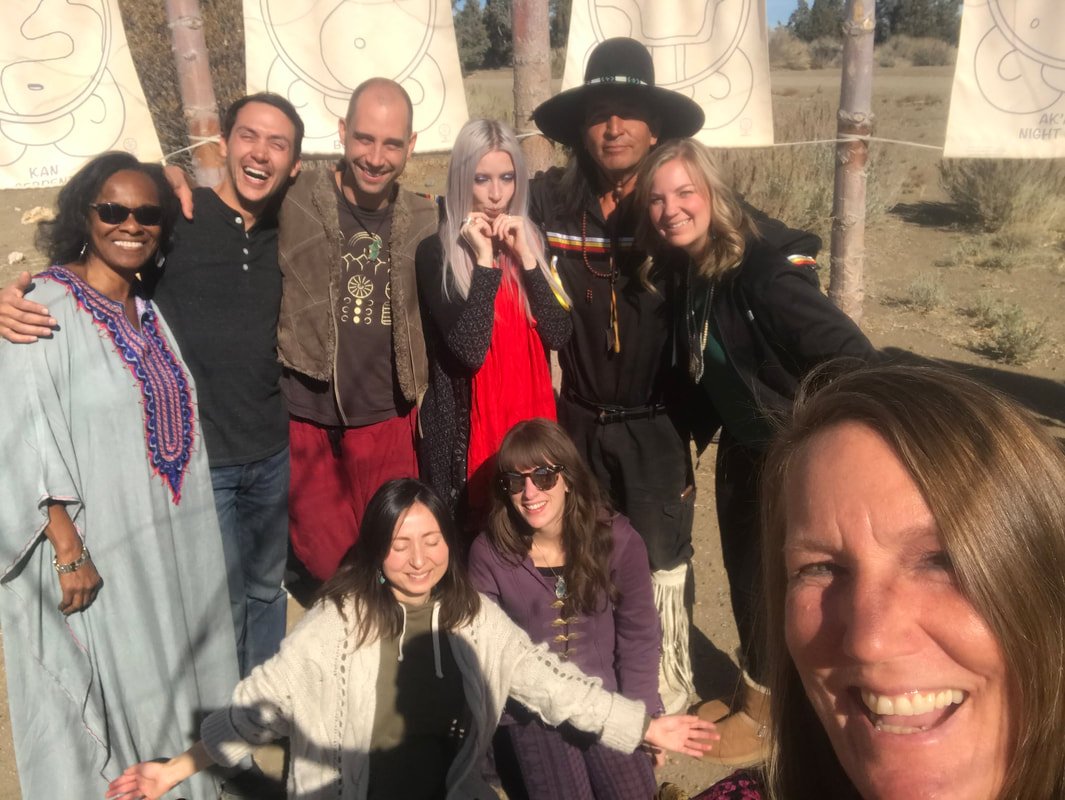From Indigenous Mexican witch healer, Mary Rojas (above) to Peruvian Shaman, Fabiola Baughman, Reno’s world of the occult is dazzling, intriguing, and led by courageous Latine leaders. Through practices rooted in ancient Indigenous traditions, these Latine healers are able to push back against post-colonial Catholic doctrines which have often quelled the voices of alternative spiritual practitioners.
Practitioners diverting from their Latin American Catholic heritage in Reno include Mary Rojas, a self-described witch who has been actively reconnecting with their Indigenous heritage through their spirituality and art.
Rojas grew up Catholic, but six years ago they started recognizing that some family practices didn’t align with Catholicism. They were derived from their Purépecha and Nahua ancestry.
The Purépecha and Nahua are Indigenous peoples in Mexico, and the Nahua is most famous for founding the Aztec empire. Rojas honors their Nahua heritage by incorporating the Aztec calendar into their daily life and using the Aztec codex as a reference for their art.
Stickers that Rojas sells featuring their logo “Saint Fax” and a “Land Back” sticker. Land back is a movement associated with decolonization and has a long history of organizing and sacrificing to get Indigenous lands back into Indigenous hands.
Rojas said that they use the Aztec calendar to judge the “vibes” of the day. Depending on what type of day it is on the calendar, Rojas will adjust how they approach it.
While Rojas was lucky enough to know what tribes they descended from, they acknowledge that it isn’t that way for everyone.
“Even if you don't know what people you come from, you can still appreciate that we are still here, we're still connected, like, you know, this is something you can look at to, you know, be proud of,” Rojas said.
As practices of decolonizing and reconnecting with deeper roots become more popular, Rojas says people need to pay attention to how they follow this process.
“I'm not going to go reconnect with like, Ojibwe practices, for example, like, that's not gonna vibe with me. You know, that's not who I am,” they said. "So when Catholics rolled up on the shores of Mexico and tried to convert everyone, they tried to connect different saints to different deities and different powers," Rojas said.
Denise Sheehan in foreground on right describes herself as a Conscious Evolution Coach, Reiki Master Teacher, Shaman, Stargate Experience Facilitator on her LinkedIn.
While there are many Latine leaders like Rojas who are practicing Indigenous traditions in Reno, several non-Latine people have also taken up such practices, including Denise Sheehan, who coordinates a program called Sky Spirit Shamans.
Sheehan, who has an English degree from the University of Nevada, Reno, then worked there from 1997 to 2009 as a prevention specialist, before getting into the spiritual business.
Sheehan describes her experience in shamanism as something serendipitous. She faced multiple near-death experiences and then realized that they led to visions and her finding her purpose in life through shamanism.
“There's so much more to our experience that's mysterious,” she told us, detailing her own evolution. “And I feel like that's the draw to spirituality, and for some to religion. But there's this, there's this miraculous essence of ourselves. It's so much more than just this human experience. And being able to access that is like the gateway to accessing the divine or the infinite or spirit or source or, often times, this may be a little out there.”
Sheehan faces several challenges, including being a white woman now practicing shamanism, which might be viewed as appropriation or just not natural.
“For me, there always has been questioning around the practices that have come to me, how they're to be shared, how to honor them with the utmost respect,” Sheehan says. “And I do feel like they came to me in a very serendipitous way. I was not seeking them and did not ever think I could have access to them.”
Sheehan also thinks that the Latine community in Reno and others are starting to find peace in ancient, Indigenous practices.
She also thinks that she should be helping in perpetuating the narrative of decolonizing religion. It is stated in her bio online, “Though my life has held deep trauma too, I was raised with privilege that comes from being white-bodied. I acknowledge, regret, and to the extent possible, apologize, for the ancestral harm caused by my ancestors and those who conquered and colonized, with lingering destruction that exists into the now.”
She believes that decolonizing religion is a part of her mission and in the process, she connects more with a different part of her lineage. “And I have worked with, you know, all of the races, and it's been really helpful too, to see that connection, that people come alive when they don't have a connection to their own ancestry,” She said. “And all of a sudden, they're able to access their families, their ancestors, through journey work and connect directly with their lineage, which is really beautiful. And it's offered me the opportunity to do that with my own lineage too, even though they're from somewhere completely different, but they've done a very honoring of that.”
Among traditional Catholics in the community, there is still pushback to shamanism which is viewed by some as misleading and even dangerous. Some say shamans use drugs to induce certain experiences. Others who practice Catholicism partake in syncretic practices– mixing Christian rituals with Indigenous beliefs.
Take for example egg cleanses, which is originally a shamanistic ritual to cleanse the spirit of bad energy. In Hispanic culture, if someone is seemingly sick out of nowhere they sometimes assume they have been given what’s known as “the evil eye”. This is when the egg cleanse is practiced in which an egg is rubbed all over the sick person’s body to rid it of the bad energy.
Many Hispanic Catholics, like the family of UNR student Nancy Vasquez, perform these cleanses despite the “witchcraft” it comes attached with. Many also use other herbs and prayers to try and heal all sorts of ailments that sometimes don’t even have medical proof of effectiveness in combating that sickness. These practices, linked to Indigenous lineage, point to a movement of decolonization within the Latine population in Reno and the U.S. in general, many times mixing in with Catholic religious practices.
One reporter on our team Alexandra Couraud participated in a private shamanic session with Peruvian Shaman Fabiola Boughman.
Boughman immigrated to Reno 20 years ago and ever since, she says, her ancestors told her to heal others through the special gifts of the divine they gave her. She specializes in working with women and feminine energy and has been working for her clientele from her house in South Reno.
During the session, Boughman started by cleansing the room and calling on archangels to be present and guide her through her ritual. After this, she began reading the aura and energy of Couraud. She was then hit by images from Couraud’s past lives which she discussed at length. This brought out many traumas from Couraud’s past.
After the session Boughman, advised by her ancestors and the archangels, gave Couraud an energetic cleansing in which she used several sound instruments as well as her hands to pull any traumas and negative energy out of Couraud.
Couraud says that “while I do not know the exact powers Fabiola holds and I do not think she in any way replaces therapy, I do know her work as a Shaman–connected in the roots of her Indigenous ancestors– inspired me to release my own traumas and to begin to validate my own story.”
In a sense that is what decolonization can represent and what Indigenous-rooted spiritual practices can bring about. It is a way for people to validate their own stories, to heal past wounds and to redefine who they are.



